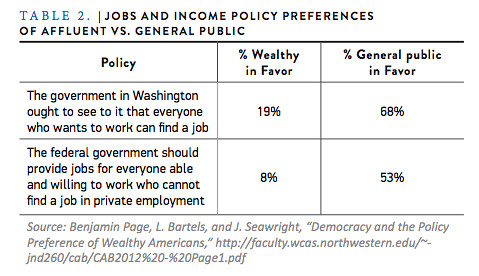Suffice it to say, there are people who are represented in Washington, but you are most likely not one of them. First, attitudes towards deficit reduction–and let’s remember that almost no one thinks deficit reduction should be the top priority:

Second, preferences regarding job creation:

And just so there’s no confusion, this is what the authors (pdf) mean by wealthy:
Most of our respondents fall into or near the top 1% of U.S. wealth-holders. Their average (mean) wealth is $14,006,338; the median is $7,500,000…To give a further idea of their economic standing: respondents’ average income is $1,040,140. About one third of them (32.4%) report incomes of $1,000,000 or more.
Now ask yourself this: to which group the wealthy or the rest of us is our political discussion oriented? When is the last time someone–any Very Serious Person–broached the idea of the government as the employer of last resort? Because it seems to be pretty popular, yet it’s not even on the radar. Considering how bent out of shape our political system was over both the Tea Partiers and the fundamentalists, minorities that never came anywhere close to 53 percent of Americans, it’s interesting how biased our political discourse is against popular policies–and it’s definitely not a liberal bias. It just shows how skewed the marketplace of ideas is: there’s no perceived political profit to be made supporting popular ideas.
This is another reason why we can’t have nice things.


Pingback: The Conservative Bias of Our Not-Liberal Media: The Environmental Beat Edition | Mike the Mad Biologist
Pingback: The Politics of Irreconcilable Differences: The Pre-K Education Edition | Mike the Mad Biologist
Pingback: Sequestration Will Be the New Normal | Mike the Mad Biologist
Pingback: Links 3/16/13 | Mike the Mad Biologist